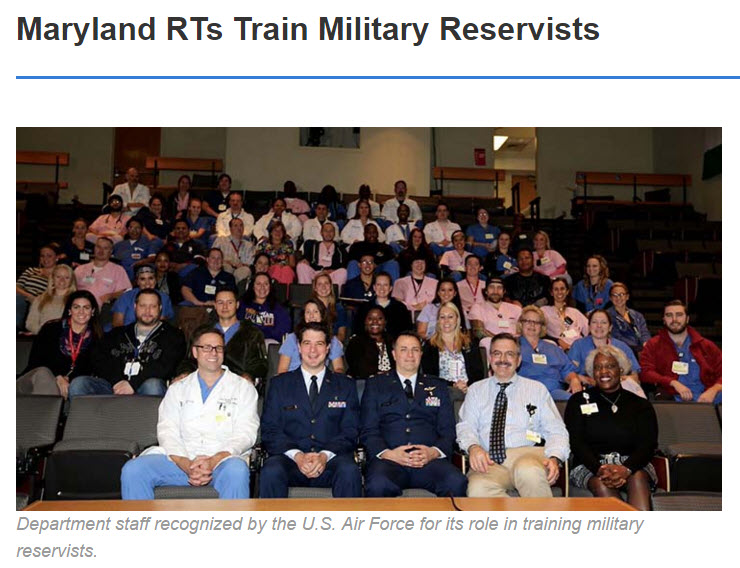
Elite military medical teams caring for wounded soldiers in some of the most volatile places in the world may now include U.S. Air Force (USAF) reservists who have been trained in respiratory care by RTs from the University of Maryland Medical Center (UMMC) and R Adams Cowley Shock Trauma Center.
“The training we provide directly supports both credentialed respiratory therapists and those with a USAF designation that enables them to provide cardiopulmonary support in the field,” says Department Director and AARC Member Chris Kircher, MHA, RRT-ACCS. “These are all Air Force reservists that are preparing for the possibility of active deployment.”
RTs By His Side
The training program was spurred by Samuel Galvagno, Jr., MD, an attending physician at UMMC who is also a lieutenant colonel in the USAF Reserve. “In his attending role, Dr. Galvagno has grown very accustomed to the level of support and skill that the UMMC respiratory therapists provide,” says Kircher. “It was from this that he approached several members of the respiratory care staff and the management team with a proposal to help train Air Force respiratory therapists.”
Dr. Galvagno says he always wished he could have one of the respiratory therapists from UMMC at his side when he was working in his military medical capacity. “Now I know that I can have a similar level of expertise as a result of this training program.”
Many RTs Involved
Reservists who come to the center work alongside department RTs in a variety of capacities, says Kircher. “Depending on the time they can spend with us, these reservists have days and some weeks to work side-by-side with our staff therapists. To assure the best exposure possible in the time they have, staff in many of our ICUs are involved.”
The hands on experience they receive in this world-renowned trauma center provides them with the skills they need to handle the respiratory issues presented by severely wounded military personnel in the field. “The reservists that function as respiratory therapists are cross trained in advanced critical care support and complement the physicians and nurses in similar roles,” says Kircher.
So far, three reservists have gone through the training and one has been deployed with a Special Operations Surgical Team. The training program continues on an as needed basis. AARC Member MSgt Bonnie McKinley, MAed, CRT, is currently stationed at UMMC to serve as a respiratory therapist liaison to the USAF’s C-STARS (Center for the Sustainment of Trauma and Readiness Skills) and reserve program.
Department staff UMMCChris Kircher accepts the USAF award on behalf of his department.
Well-Deserved RecognitionThe RT department at UMMC was officially recognized for the role it is playing in training reservists just prior to last year’s Respiratory Care Week, when the USAF presented the department with a special award acknowledging their service. The inscription on the base of the award states:
University of Maryland Respiratory Therapy Program
In recognition of your steadfast support for our critical care air transport mission
943rd Aerospace Medicine Squadron
Davis-Monthan Air Force Base, AZ
2015“Giving back to those who serve in any capacity is always important,” says Kircher. “The fact that we were able to do so in a way that coupled that very important support with our profession felt amazing for our staff. It was a very proud moment for our team and demonstrated that UMMC respiratory care is supporting the profession beyond our own walls.”
Says Dr. Galvagno, “The civilian-military partnership established between the United States Air Force Reserve and the University of Maryland Medical Center respiratory therapists represents an unparalleled opportunity to help keep our reservists current with state-of-the-art practices. This partnership has significantly enhanced the ability of our respiratory therapists to both stay current and to stay abreast of the most recent advances in the field.”